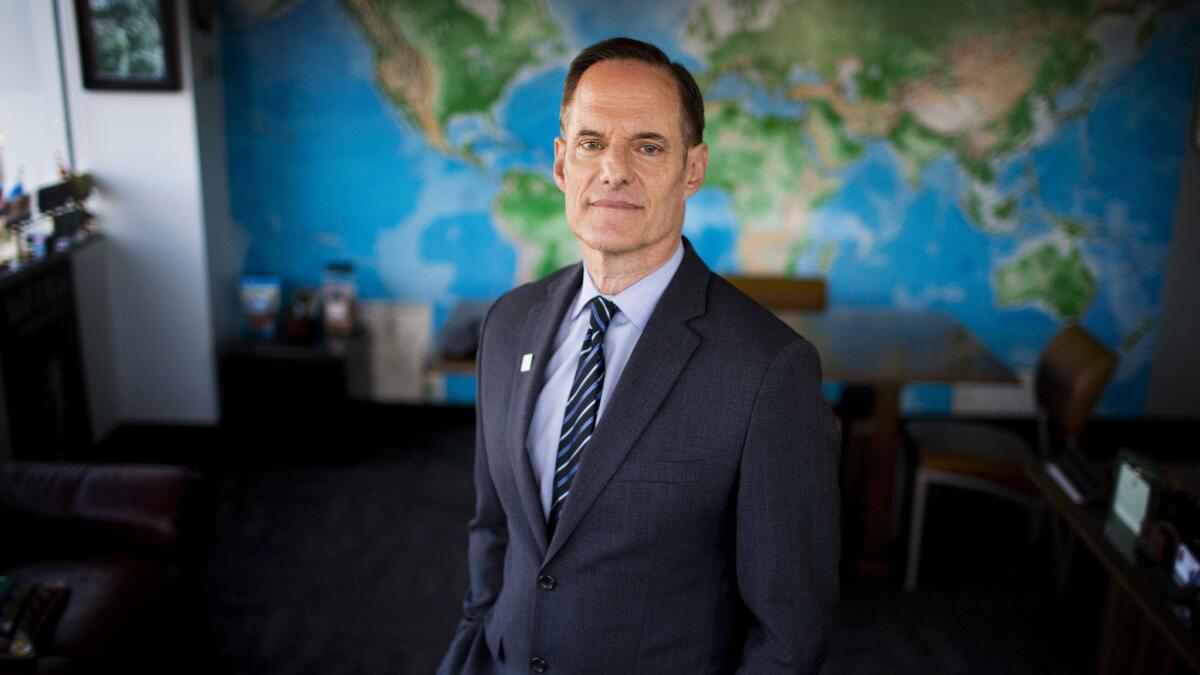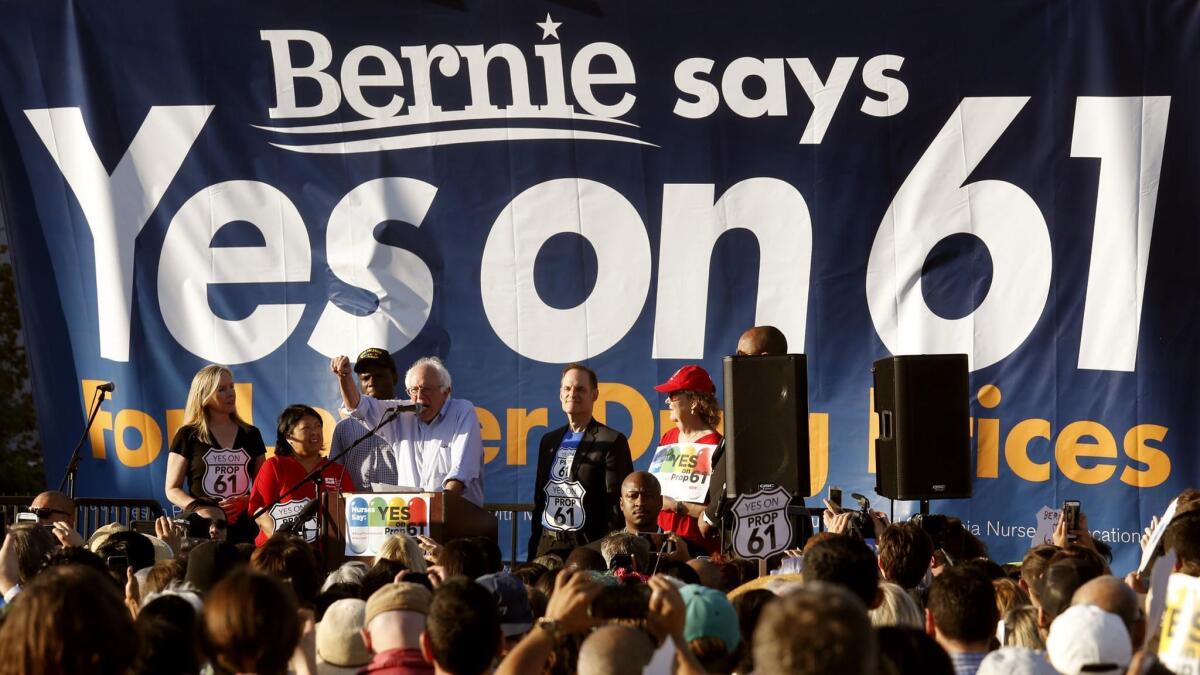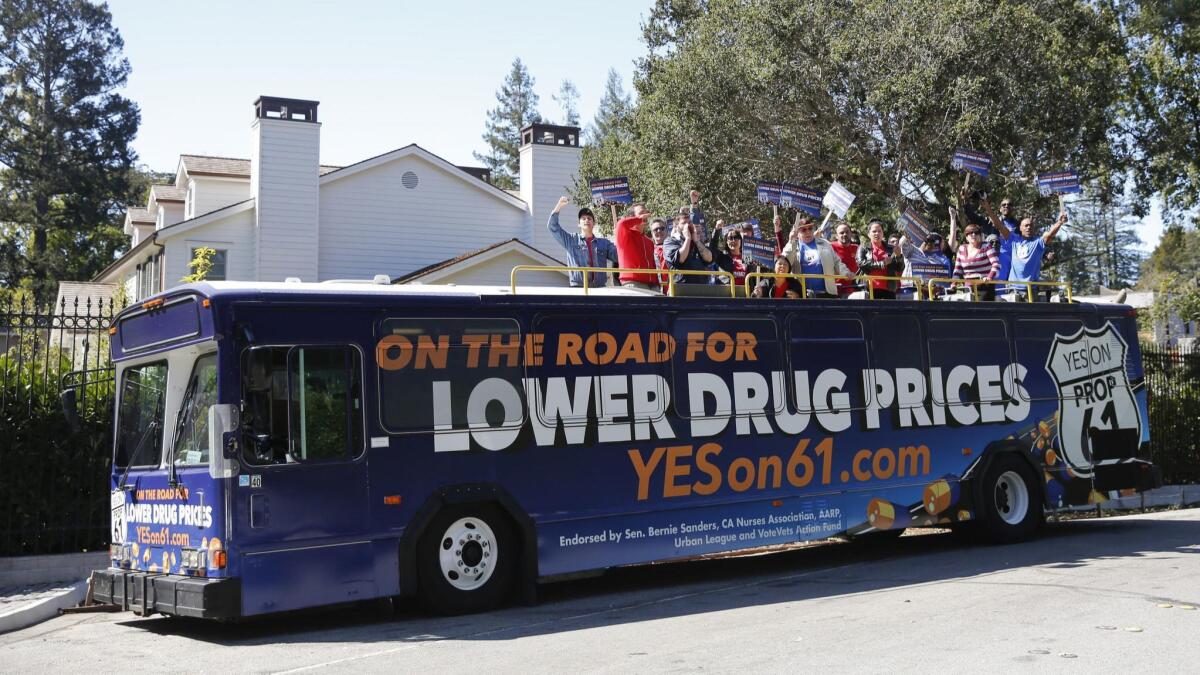‘Thug,’ ‘Bully,’ ‘Satan’: This L.A. activist has never shied from controversy while building an AIDS political powerhouse

- Share via
In a state as expensive as California, and during a political year as crowded as 2016, most organizations would struggle to sponsor just one ballot measure. Fighting on two fronts is often reserved for the most formidable interest groups.
But that’s just what the Los Angeles-based AIDS Healthcare Foundation is doing this year.
The foundation, led by longtime HIV activist Michael Weinstein, has become one of the biggest — and most controversial — nonprofits dedicated to fighting the disease and is quickly becoming a political powerhouse. It has a $1.2-billion budget and two high-profile measures on California’s ballot: Proposition 60, which would require condom use in adult film production, and Proposition 61, which seeks to lower prices state agencies pay for prescription drugs. AIDS Healthcare Foundation has contributed more than $19 million to the initiatives.
It is also funding a similar drug-pricing initiative in Ohio, its first out-of-state campaign, and a measure set for the Los Angeles city ballot in March that seeks to stymie “mega-developments” in Hollywood.
“We’re doing things on a scale that we haven’t before,” Weinstein said in a recent interview from his office in a Hollywood high-rise.
Weinstein has come a long way since the late 1980s, when he started with a $50,000 budget and a narrowly tailored mission to provide end-of-life care to those dying of AIDS. Today, the foundation manages 450 clinics and pharmacies that serve 629,000 patients worldwide. Its Out of the Closet thrift stores and campy billboards — a recent one advertised its free sexually transmitted disease screening services with the slogan “Feel the Burn?” — are Los Angeles mainstays.
A fast-talking Brooklyn native who has little patience for his critics, Weinstein has been labeled a “bully,” “Satan” and, as one longtime Los Angeles County supervisor put it, a “thug.” His brand of advocacy is aggressive and brash, born out of the early days of AIDS activism when Weinstein helped defeat a state ballot measure that would have allowed people with the disease to be quarantined.
Weinstein often dismisses those who publicly oppose him, including other HIV and LGBT advocacy groups, as shills who are “in the pocket” of powerful industries. He has earned a reputation as a fiercely litigious leader.
“If the worst thing anyone can say about me is that I’m zealous in supporting the issues that I think are right … I can live with that,” Weinstein said.
Proposition 60 would require adult film actors to use condoms during sex scenes and is inspired by a similar L.A. County ballot measure Weinstein helped pass in 2012. Weinstein calls it a matter of workplace safety and of public health.
The Yes campaign has reported $4.5 million in contributions, all of it coming from the AIDS Healthcare Foundation. Opponents, who have raised just $433,000, say the measure would allow any Californian to sue adult film producers or others with a financial interest in a production if the state doesn’t act on complaints of violations, and could lead to frivolous lawsuits.
But the foundation is focusing the bulk of its advocacy budget on Proposition 61, hoping to tap into public anger over prescription drug prices, a bread-and-butter issue for the sprawling healthcare organization.
By taking on drug manufacturers in California and Ohio, a crucial swing state, Weinstein had hoped to launch drug pricing onto the presidential debate stage. His plans faltered when, after months of legal wrangling, Ohio officials placed his measure on the November 2017 ballot instead.
Now, Weinstein is pinning all his hopes of sparking that national movement on California — and is considering a similar effort in Florida.
Proposition 61 would mandate that state agencies pay no more for a drug than the U.S. Department of Veterans Affairs, which traditionally pays some of the lowest prices for medicines. The Yes campaign has sent double-decker buses full of nurses up and down the state, parking them outside the house of a former drug company executive and at rallies. Full-page newspaper ads have challenged the CEOs of top drugmakers to a debate, and Vermont Sen. Bernie Sanders has appeared in the campaign’s TV ads.

“It is a very profound moral issue,” Sanders said at a rally in Hollywood last week, with Weinstein at his side. “It is time for the pharmaceutical industry to stop ripping off the people of this country…. The entire nation is looking at California.”
Critics have raised the specter of unintended consequences, saying drug companies could simply raise drug prices for veterans or refuse to provide their drugs at lower costs to California.
The pharmaceutical industry has touted those arguments in its campaign against the measure, raising a $94.4-million war chest and blanketing the airwaves with ads featuring doctors and veterans. It has also targeted Weinstein and his foundation, which has contributed nearly all of the Yes campaign’s $14.5 million.
They’ve pointed out that the measure exempts California’s largest state-run health program: Medi-Cal managed care, a program that brings in $12 million a year for the foundation and its pharmacies. The No campaign has also pointed to lawsuits the AIDS Healthcare Foundation has pending with L.A. County and the state over how much they should be reimbursed for healthcare services for patients who are assisted by government programs.
“If they really wanted to do something for the cost of state healthcare programs in California, why exempt the largest program of all?” said Kathy Fairbanks, a spokeswoman for the No on 61 campaign. “It calls into question the efficacy of Prop. 61 and also the motives behind it.”
Weinstein dismisses the idea that the foundation rushed to the ballot box.
“We’ve been supporting other people’s legislation on this subject for more than a dozen years,” he said. “It was hardly a rash decision.”
After two bills to bolster drug pricing transparency failed this session, Weinstein said he was convinced that a ballot measure was the only way to bring change.

Weinstein’s efforts on condom use in adult films have similarly been thwarted. Complaining that L.A. County officials have failed to adequately enforce Measure B, the ballot measure voters passed in 2012, the AIDS Healthcare Foundation took its fight to the state Legislature and found an ally in Assemblyman Isadore Hall III (D-Compton).
Hall, now a state senator, introduced two AIDS Healthcare Foundation-sponsored bills on the subject in 2013. In the fight that ensued, dozens of adult film actors descended on the Capitol to testify against the measure, while former performers described the horror of contracting HIV on set.
At one point, Weinstein accused Assemblyman Mike Gatto (D-Glendale) of stalling one of Hall’s bills in committee and blanketed the lawmaker’s district with mailers and robocalls that labeled Gatto the “pornographers’ best friend.” Gatto criticized Weinstein for what he called “scorched-earth” tactics.
Neither bill made it out of committee for a floor vote.
“They certainly push the bounds of impropriety,” Gatto said in an interview recently. “Ultimately, I would question whether those kinds of tactics really deliver that much for the organization.”
Weinstein likes to point out that, despite such criticism about the large sums of money the group dedicates toward political advocacy, the amount he estimates the AIDS Healthcare Foundation will spend on advocacy this year is still less than 2% of its overall budget.
“The primary business of this organization is providing medical care, and that still occupies more of my time than anything else,” he said.
So how did this once-struggling AIDS foundation develop such deep pockets for a growing political agenda?
It turns out that providing “cutting edge medicine and advocacy regardless of ability to pay,” as the organization’s mission statement reads, can be quite lucrative. The foundation brought in more than $800 million — roughly 80% of its total budget — through its pharmacies last year.
Weinstein’s stances on some of those issues have drawn strong criticism from many LGBT activists. In particular, he’s been condemned for his dismissal of Truvada, a once-a-day preventive HIV pill, as a “party drug” that would lead to decreased condom use.
Scott Wiener, a San Francisco County supervisor and state Senate candidate, said Weinstein and the AIDS Healthcare Foundation are preoccupied with a “condoms-only” attitude toward HIV prevention, to the detriment of other more holistic approaches such as the one that’s helped San Francisco dramatically reduce its rate of new infections.
“They have a lot of money to spend, and they’re willing to spend that money to promote anti-science points of view and to get involved in issues that have nothing to do with HIV advocacy,” said Wiener, who has come out against both propositions and recently disclosed he’s taking Truvada.
But where others see costly battles that distract from the group’s core mission, the AIDS Healthcare Foundation sees crucial steps in caring for its patients.
Lowering prescription drug prices helps the AIDS Healthcare Foundation serve more patients, Weinstein reasons, and fighting “runaway” development in the Hollywood area prevents clients and employees alike from being displaced by rising housing costs.
Rand Martin, the foundation’s lobbyist, said he’s not surprised that the foundation has expanded its ambitions in recent years.
“Their aspirations have always been broad, and they have always wanted to do big things in Sacramento,” Martin said. “If they’re going to be a big player in Los Angeles, if they’re going to be a big player in California, they’re not going to limit their involvement in policies to just the things people think they should be working on.”
christine.maiduc@latimes.com; javier.panzar@latimes.com
For more on California politics, follow @cmaiduc and @jpanzar.
More to Read
Get the L.A. Times Politics newsletter
Deeply reported insights into legislation, politics and policy from Sacramento, Washington and beyond. In your inbox twice per week.
You may occasionally receive promotional content from the Los Angeles Times.












